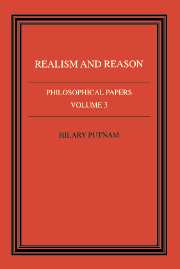Book contents
- Frontmatter
- Contents
- Dedication
- Introduction
- 1 Models and reality
- 2 Equivalence
- 3 Possibility and necessity
- 4 Reference and truth
- 5 ‘Two dogmas’ revisited
- 6 There is at least one a priori truth
- 7 Analyticity and apriority: beyond Wittgenstein and Quine
- 8 Computational psychology and interpretation theory
- 9 Reflections on Goodman's Ways of Worldmaking
- 10 Convention: a theme in philosophy
- 11 Philosophers and human understanding
- 12 Why there isn't a ready-made world
- 13 Why reason can't be naturalized
- 14 Quantum mechanics and the observer
- 15 Vagueness and alternative logic
- 16 Beyond historicism
- Bibliography
- Acknowledgements
- Index
3 - Possibility and necessity
Published online by Cambridge University Press: 06 January 2010
- Frontmatter
- Contents
- Dedication
- Introduction
- 1 Models and reality
- 2 Equivalence
- 3 Possibility and necessity
- 4 Reference and truth
- 5 ‘Two dogmas’ revisited
- 6 There is at least one a priori truth
- 7 Analyticity and apriority: beyond Wittgenstein and Quine
- 8 Computational psychology and interpretation theory
- 9 Reflections on Goodman's Ways of Worldmaking
- 10 Convention: a theme in philosophy
- 11 Philosophers and human understanding
- 12 Why there isn't a ready-made world
- 13 Why reason can't be naturalized
- 14 Quantum mechanics and the observer
- 15 Vagueness and alternative logic
- 16 Beyond historicism
- Bibliography
- Acknowledgements
- Index
Summary
The use by logicians and philosophers of the notions of possibility and necessity goes back to Aristotle. In the modern period, enormous use was made of the notion of a ‘possible world’ by Leibniz. Yet the epistemological and metaphysical foundations of these notions remain obscure.
Although empiricist philosophers tried to restrict necessity to linguistic necessity, or even to banish it from philosophy altogether, the notions have proved, like other perennial philosophical notions, to be extremely hardy. (Some philosophers would complain that they are hardy weeds.) As a result of the work described below, modal logic, possible worlds semantics (a theory due to Richard Montague which has connections with what we shall discuss here, although it falls beyond the purview of this article), the topic of ‘essences’, and the theory of counterfactual conditionals have all been pursued with vigor. Indeed, the concepts of necessity and possibility have enjoyed an unprecedented philosophical revival.
In this article I shall first discuss the strange subject of quantum logic, which well illustrates the case for abandoning the notion of necessity (in the sense of apriority) altogether, and then look at two representative examples of the work on the non-epistemic notion of necessity, metaphysical necessity, as it is grandly called. These examples are theories of Saul Kripke and David Lewis, respectively, and they have been the pace-setters for the revival of talk about possible worlds and metaphysically necessary truths.
- Type
- Chapter
- Information
- Philosophical Papers , pp. 46 - 68Publisher: Cambridge University PressPrint publication year: 1983
- 8
- Cited by



